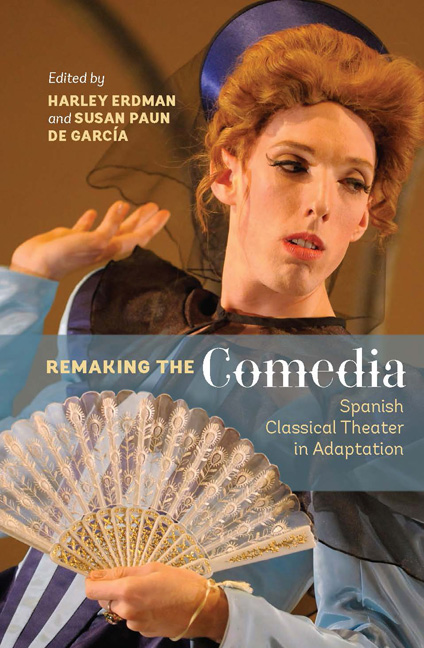Book contents
- Frontmatter
- Contents
- Illustrations
- Contributors
- Preface
- Note to the Reader
- Acknowledgements
- PART I THEORIZING
- PART II SURVEYING
- 5 Refundición Redux: Revisiting the Rewritten Comedia
- 6 Pepe Estruch and the Performance of Golden Age Drama: International Relationships under Franco and Democratic Theatrical Cultures
- 7 Thinking Globally, Acting Locally, and Performing Nationalism: Local, National, and Global Remakes of the Comedia
- 8 Four Decades of the Chamizal Siglo de Oro Drama Festival and the Evolution of Comedia Performance
- 9 Early Modern Dramaturgas: A Contemporary Performance History
- 10 Adapting Lope de Vega for the English-Speaking Stage
- PART III SPOTLIGHTING
- PART IV SHIFTING
- Play Titles Cited
- Works Cited
- Index
8 - Four Decades of the Chamizal Siglo de Oro Drama Festival and the Evolution of Comedia Performance
from PART II - SURVEYING
Published online by Cambridge University Press: 05 December 2015
- Frontmatter
- Contents
- Illustrations
- Contributors
- Preface
- Note to the Reader
- Acknowledgements
- PART I THEORIZING
- PART II SURVEYING
- 5 Refundición Redux: Revisiting the Rewritten Comedia
- 6 Pepe Estruch and the Performance of Golden Age Drama: International Relationships under Franco and Democratic Theatrical Cultures
- 7 Thinking Globally, Acting Locally, and Performing Nationalism: Local, National, and Global Remakes of the Comedia
- 8 Four Decades of the Chamizal Siglo de Oro Drama Festival and the Evolution of Comedia Performance
- 9 Early Modern Dramaturgas: A Contemporary Performance History
- 10 Adapting Lope de Vega for the English-Speaking Stage
- PART III SPOTLIGHTING
- PART IV SHIFTING
- Play Titles Cited
- Works Cited
- Index
Summary
As the longest-running festival dedicated to Golden Age performance to date, the evolution of the Chamizal National Memorial's annual Siglo de Oro Drama Festival emerges as a study of Comedia adaptation in microcosm, reflecting shifting performance trends across the world and illustrating the Comedia's remarkable flexibility for twentieth- and twenty-first-century audiences. Not only has this unique gathering reconstructed a centuries-old theatrical tradition, it has paved the way for a future generation to reclaim and redesign traditional conventions, both visually and textually, in ways their Golden Age creators and contemporaries could never have imagined.
One could argue that without the Chamizal festival there would be little or no early modern Spanish theater produced on any stage in the world today. The first festival, held in 1976, quickly ignited a chain reaction that attracted theater companies across the Spanish- and English-speaking worlds. Only two years later, Spain established a similar festival in Almagro, and in 1985 organized the Compañía Nacional de Teatro Clásico. Since 1976 Chamizal has hosted performances of more than three hundred plays based on Golden Age texts. Perhaps not surprisingly, as of 2012, Calderón emerges as the most oft-performed playwright of the group (seventy-four productions), followed by Lope de Vega (sixty-five productions); combined, they comprise roughly forty-four percent of all works performed at the festival, which cements the pair squarely in the canon of modern favorites. After Calderón and Lope the numbers drop significantly: Tirso de Molina (thirty-three productions), Miguel de Cervantes (twenty-two productions), Juan Ruiz de Alarcón (nineteen productions), and finally, one of only two women writers ever to appear at the festival, Sor Juana Inés de la Cruz (fifteen productions). The overwhelming majority of these productions feature the Comedia, and though entremeses and autos are chosen with some regularity, their combined total is overshadowed by the nearly equal number of stage renditions of non-dramatic classical texts, such as dramatic readings of poetry, adaptations of narrative works (in particular the Quijote and Lazarillo de Tormes), and pastiches of all varieties.
- Type
- Chapter
- Information
- Remaking the ComediaSpanish Classical Theater in Adaptation, pp. 75 - 82Publisher: Boydell & BrewerPrint publication year: 2015



